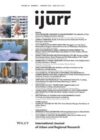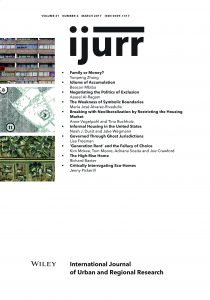Volume 41 Issue 2 March 2017
In This Issue...
What is today’s housing question? In the late nineteenth century, confronting the industrial city, Engels posed the housing question and noted capital’s limits in ‘solving’ the housing crisis. Today, his inquiry remains as pertinent as ever, except that the contours of the question are somewhat different. This collection of articles provides vitally important insight into today’s housing question, such as the technocracy of eco-homes, or the rise of ‘Generation Rent’ in the restructured economies of the North Atlantic, or the prevalence of informality, for example ‘ghost jurisdictions,’ as a logic of governance and form of rule. Today’s housing question can no longer be posed in relation to Manchester and Leeds; as the articles indicate, it must also be posed in relation to Shanghai, Harare, Kuwait City, and Montevideo. The struggles over housing in these cities expand the analytics of dispossession and displacement, foreground complex forms of state violence and welfare, and make visible forms of resistance that seek to claim dignity. In turn, as demonstrated by policy experiments in Hamburg, such processes demand conceptual frameworks attentive to the limits of neoliberalization as well as the limits of theories that overly rely on the category of neoliberalism. The latter might very well return us full circle to Engels. As we ponder everyday life in Aylesbury Estate, we are confronted with the charred skeleton of Grenfell Tower and the deaths that ensued through the wilful neglect of working class families. Austerity has surely sharpened such necropolitics, but these are in fact old instruments, forged in the crucible of class dispossession and racialized exploitation.
— Ananya Roy
Articles
Family or Money? The False Dilemma in Property Dispossession in Shanghai
Published online on May 16th, 2017 | DOI: 10.1111/1468-2427.12455 (p 194-212)
Idioms of Accumulation: Corporate Accumulation by Dispossession in Urban Zimbabwe
Published online on Jun 1st, 2017 | DOI: 10.1111/1468-2427.12468 (p 213-234)
Negotiating the Politics of Exclusion: Georges Candilis, Housing and the Kuwaiti Welfare State
Published online on Jun 8th, 2017 | DOI: 10.1111/1468-2427.12456 (p 235-250)
The Weakness Of Symbolic Boundaries: Handling Exclusion Among Montevideo’s Squatters
Published online on Mar 21st, 2017 | DOI: 10.1111/1468-2427.12450 (p 251-265)
Breaking With Neoliberalization by Restricting The Housing Market: Novel Urban Policies and the Case of Hamburg
Published online on Jun 16th, 2017 | DOI: 10.1111/1468-2427.12490 (p 266-281)
Informal Housing in the United States
Published online on Mar 6th, 2017 | DOI: 10.1111/1468-2427.12444 (p 282-297)
Governed Through Ghost Jurisdictions: Municipal Law, Inner Suburbs and Rooming Houses
Published online on Feb 7th, 2017 | DOI: 10.1111/1468-2427.12441 (p 298-317)
‘Generation Rent’ and The Fallacy of Choice
Published online on May 4th, 2017 | DOI: 10.1111/1468-2427.12445 (p 318-333)
The High-Rise Home: Verticality as Practice in London
Published online on May 4th, 2017 | DOI: 10.1111/1468-2427.12451 (p 334-352)
Critically Interrogating Eco-Homes
Published online on May 4th, 2017 | DOI: 10.1111/1468-2427.12453 (p 353-365)
Book Reviews
Carolyn Gallaher 2016: The Politics of Staying Put: Condo Conversion and Tenant Right-to-buy in Washington, DC. Philadelphia, PA: Temple University Press
Published online on Aug 21st, 2017 | DOI: 10.1111/1468-2427.12471 (p 366-367)
Robert J. Chaskin and Mark L. Joseph 2015: Integrating the Inner City: The Promise and Perils of Mixed-income Public Housing Transformation. Chicago: University of Chicago Press
Published online on Aug 21st, 2017 | DOI: 10.1111/1468-2427.12472 (p 367-369)
Peter Herrle, Astrid Ley and Josefine Fokdal (eds.) 2015: From Local Action to Global Networks: Housing the Urban Poor. Farnham: Ashgate
Published online on Aug 21st, 2017 | DOI: 10.1111/1468-2427.12473 (p 369-370)
Michaël Tatham 2016: With, Without, or Against the State? How European Regions Play the Brussels Game. Oxford: Oxford University Press
Published online on Aug 21st, 2017 | DOI: 10.1111/1468-2427.12474 (p 370-372)
Eugenie L. Birch, Shahana Chattaraj and Susan M. Wachter (eds.) 2016: Slums: How Informal Real Estate Markets Work. Philadelphia: University of Pennsylvania Press
Published online on Aug 21st, 2017 | DOI: 10.1111/1468-2427.12475 (p 372-373)
Philip Harrison, Graeme Gotz, Alison Todes and Chris Wray (eds.) 2014: Changing Space, Changing City: Johannesburg after Apartheid. Johannesburg: Wits University Press
Published online on Aug 21st, 2017 | DOI: 10.1111/1468-2427.12476 (p 374-375)
Filip de Boeck and Sammy Baloji 2016: Suturing the City. Living Together in Congo’s Urban Worlds. London: Autograph ABP
Published online on Aug 21st, 2017 | DOI: 10.1111/1468-2427.12477 (p 375-376)
Amale Andraos, Nora Akawi and Caitlin Blanchfield (eds.) 2016: The Arab City: Architecture and Representation. New York: Columbia Books on Architecture and the City, Columbia University Press
Published online on Aug 21st, 2017 | DOI: 10.1111/1468-2427.12478 (p 376-378)
Issues in this volume
January 2017
March 2017
May 2017
July 2017
September 2017
November 2017

